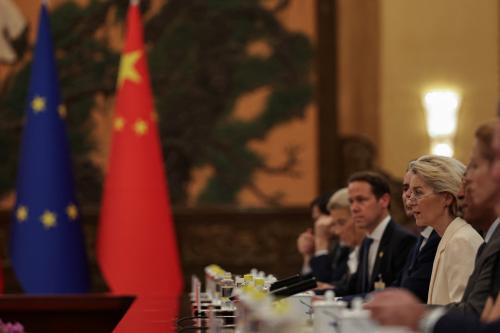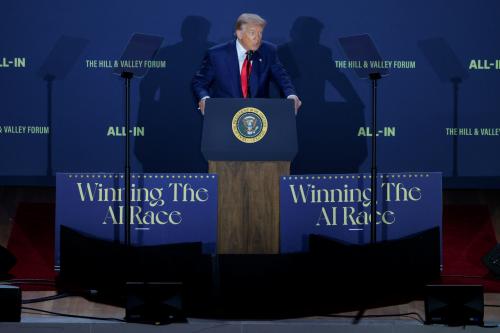If you want to understand what drove the intense opposition to the nuclear deal with Iran in certain quarters of the American political establishment, as well as across the broader Middle East, all you have to do is look at the photos from Iranian president Hassan Rouhani’s inaugural tour of Europe this week. The most notorious shot shows plywood barricades concealing ancient Roman statues, apparently out of concern that their nudity would shock or offend the leader of an Islamic theocracy.
The alacrity with which Italian leaders jettisoned their values and historical legacy in hopes of gaining some advantage in Iran’s post-sanctions gold rush is precisely what nuclear deal opponents predicted and hoped to forestall. After all, a Europe that would so readily censor the treasures of its own glorious antiquity, in an obsequious gesture that was apparently unbidden by Tehran, is unlikely to jeopardize any budding business to penalize any Iranian infractions of the agreement, or to put pressure on Iran over any of its other objectionable policies.
After a deal, the Islamic Republic will be back in business, its standing as an investment destination restored and its place in the community of nations effectively normalized. This is, of course, precisely what Tehran is seeking and what Hassan Rouhani was elected to the presidency to accomplish — redemption. An imperfect, incomplete redemption, but a new beginning nonetheless.
But redemption is precisely what [Israeli Prime Minister Benjamin] Netanyahu and other opponents of an Iranian deal are determined to prevent. They appreciate that once the current network of multilateral sanctions is unraveled, it will never be reinstated, absent some extraordinary provocation by Tehran. The presumption, then, is that the threat posed by Iran’s regional ambitions will never be successfully blunted. For Netanyahu—and for many in the American policy community—that is an unacceptable outcome. They believe, as the prime minister declared on Tuesday, that “If Iran wants to be treated like a normal country, let it act like a normal country.”
Netanyahu and other opponents of the deal did not achieve that goal. Much of the U.S. unilateral sanctions regime remains intact, and these measures—along with some residual uncertainty about the longevity of the nuclear deal—will restrain the horizons of Iran’s economic and geopolitical reintegration into the international community. But for all practical purposes, the Islamic Republic’s redemption is complete.
The alacrity with which Italian leaders jettisoned their values and historical legacy in hopes of gaining some advantage in Iran’s post-sanctions gold rush is precisely what nuclear deal opponents predicted and hoped to forestall.
So in the wake of this broad normalization, how can the world continue to nudge Tehran toward “acting like a normal country”? For starters, by restraining the impulse to placate ideological excesses of Iranian politics—or, for that matter, those of its neighbors.
The Italian deference to Rouhani is not without precedent: similar measures were taken last year to protect the delicate sensibilities of Abu Dhabi’s crown prince. And it was not without foundation—in 1999, photos of a previous Iranian president, Mohammad Khatami, enjoying an Italian state dinner provoked a furor among opponents of his reformist agenda because they revealed wine glasses on the tables.
However, there were an infinite number of ways for circumventing these civilizational conflicts without repudiating Italian artistic glory. To avoid a repeat of his Roman fiasco, Khatami simply adapted his future European visits to incorporate a greater number of official breakfast meetings, where abstinence was more easily ensured.
Iran’s rehabilitation without full-fledged reformation compounds the already urgent challenges of an unstable Middle East. Its reintegration can be a stabilizing force, but only if Tehran reconciles itself to the world, rather than the reverse.
The Brookings Institution is committed to quality, independence, and impact.
We are supported by a diverse array of funders. In line with our values and policies, each Brookings publication represents the sole views of its author(s).




Commentary
The art of doing business with Iran
January 27, 2016